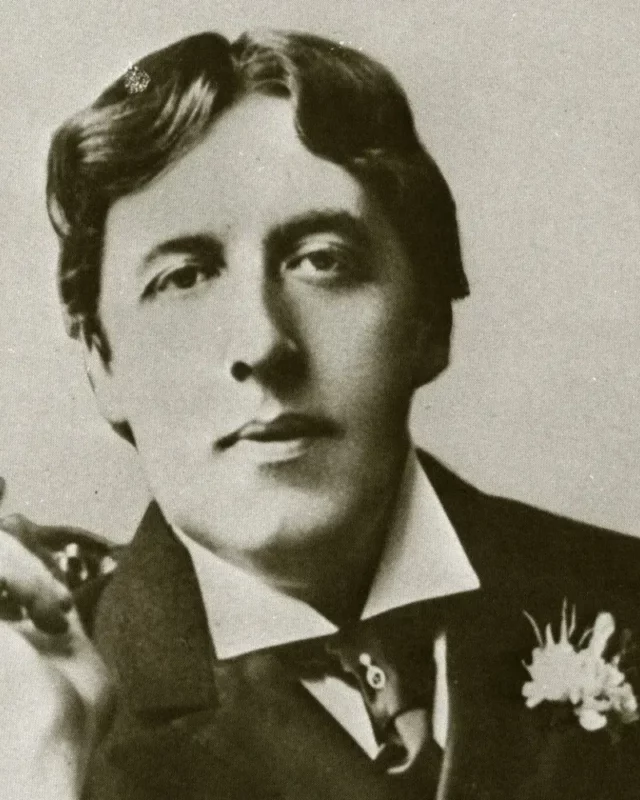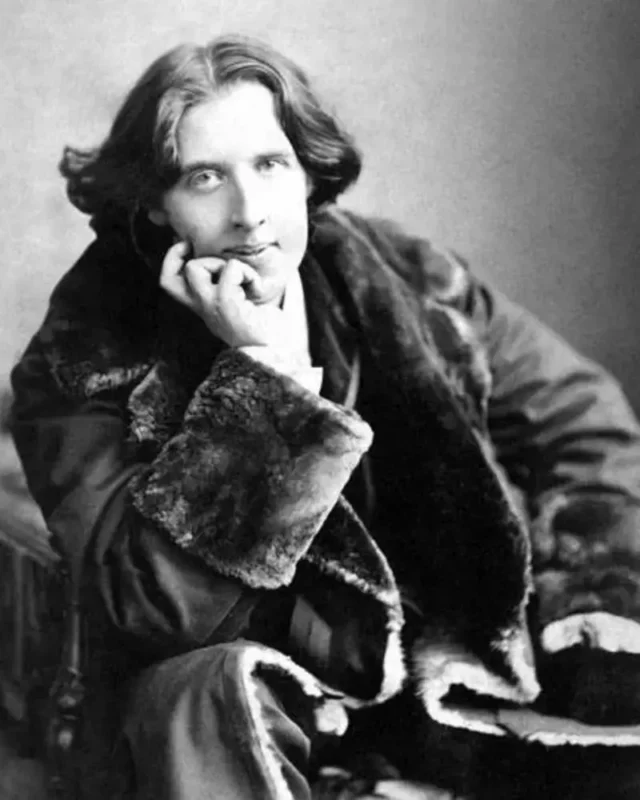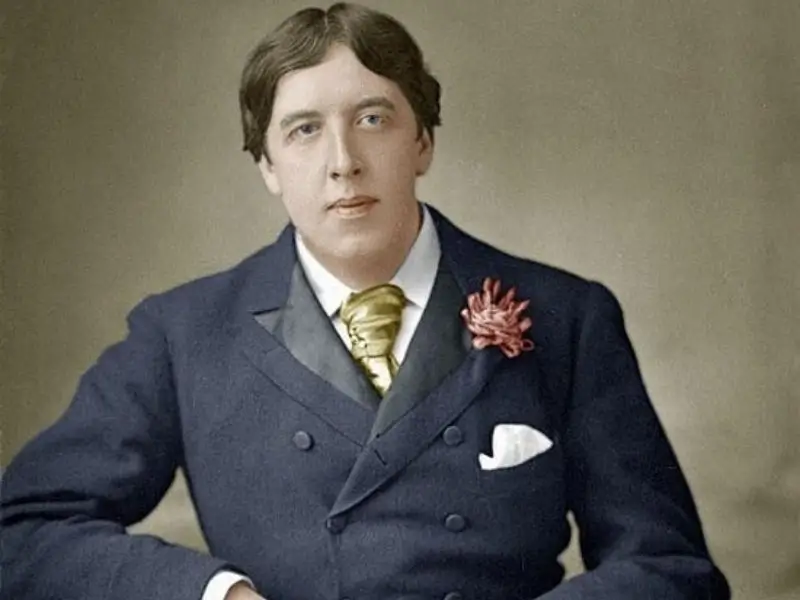Oscar Wilde, the renowned Irish playwright, novelist, and poet, captivated the literary world in the late 19th century with his wit and flamboyant personality.
This article delves into the fascinating life of Wilde, from his privileged upbringing and stellar education to his meteoric rise to fame and subsequent downfall.
With a focus on his personal relationships, legal trials, and tragic imprisonment, we explore the enduring legacy and impact of this enigmatic literary figure.

image source: facebook
Early Life and Education
During his formative years, Oscar Wilde’s early life and education played a crucial role in shaping his future as one of the most renowned playwrights and authors of the Victorian era.
Born on October 16, 1854, in Dublin, Ireland, Wilde was the second son of Sir William Wilde, a respected surgeon, and Jane Wilde, a prominent poet and nationalist. Growing up in a household that valued intellectual pursuits, Wilde developed a love for literature and learning from an early age.
Wilde received a quality education at Portora Royal School in Enniskillen, where he excelled academically and demonstrated a keen interest in the classics. He later studied at Trinity College, Dublin, where he distinguished himself as a scholar and won several academic awards. Upon graduating, he was awarded a scholarship to Magdalen College, Oxford, where he continued his studies in classics.
At Oxford, Wilde’s wit and charm quickly made him a popular figure among his peers, and he became known for his flamboyant personality and eccentric fashion choices. He also began to gain recognition for his poetry and prose, which showcased his unique style and satirical wit.
The early life and education of Oscar Wilde laid the foundation for his later success as a writer. The intellectual environment in which he was raised cultivated his love for literature, while his academic achievements at prestigious institutions honed his writing skills and shaped his distinctive voice. These early experiences would prove instrumental in his future literary endeavors.
Rise to Fame and Literary Success
Oscar Wilde’s rise to fame and literary success was marked by his exceptional talent, captivating wit, and unique style of writing. His career took off in the late 1880s with the publication of his first major play, ‘Lady Windermere’s Fan.’ The play was an instant success, praised for its sharp dialogue, clever plot twists, and social satire. Wilde’s popularity skyrocketed, and he became a prominent figure in London’s literary and social circles.
Following the success of ‘Lady Windermere’s Fan,’ Wilde continued to produce a string of hit plays, including ‘A Woman of No Importance,’ ‘An Ideal Husband,’ and perhaps his most famous work, ‘The Importance of Being Earnest.’ His plays were known for their sparkling wit, clever wordplay, and exploration of societal norms and conventions.
In addition to his plays, Wilde also gained recognition as a poet and essayist. He published several collections of poetry, including ‘The Ballad of Reading Gaol,’ which was inspired by his own experiences in prison. His essays, such as ‘The Decay of Lying’ and ‘The Critic as Artist,’ showcased his sharp intellect and incisive observations on art and culture.
Wilde’s rise to fame was not without controversy. His flamboyant personality, extravagant lifestyle, and unconventional beliefs made him a target of criticism and ridicule. Nevertheless, his talent and charisma continued to attract audiences, and he remained a celebrated figure in the literary world.

image source: facebook
Check out body measurements of other actresses
| park han byul measurements |
| queen rania measurements |
| paul rodgers measurements |
| rafael amaya measurements |
| rachel taylor measurements |
Oscar Wilde Body Measurements And Personal Details:-
Full name at birth:Oscar Fingal O`Flahertie Wills Wilde
Date of birth:16 October1854
Date of death:29 November1900
Location of death:ParisFrance
Birthplace:Dublin, ireland
Gender:Male
Zodiac sign:Libra
Nationality:Irish
Occupation:Poet, playwright, novelist, journalist, essayist, critic, editor, aesthete, dandy, letter writer
Sexual orientation:Bisexual
Religion:Roman catholic
Father:William Wilde
Mother:Jane Wilde
Height:6′ 3″ (190 cm)
Hair color:Brown – dark
Eye color:Hazel
Build:Average
Personal Life and Relationships
After achieving great fame and success in his literary career, Oscar Wilde’s personal life and relationships came under scrutiny and played a significant role in shaping his reputation. Wilde’s most well-known relationship was with Lord Alfred Douglas, a young poet and aristocrat. Their relationship, which began in 1891, was highly controversial due to the societal norms and laws of the time. Wilde’s association with Douglas ultimately led to his downfall.
The public scrutiny intensified when Wilde’s relationship with Douglas became public knowledge. Wilde was charged with ‘gross indecency’ in 1895, as homosexuality was considered a criminal offense in Victorian England. He was subsequently sentenced to two years of hard labor.
Wilde’s personal life and relationships were not limited to Douglas. He was married to Constance Lloyd in 1884, and together they had two sons. However, their marriage faced difficulties, partly due to Wilde’s own homosexual inclinations. They separated in 1891, shortly before Wilde’s relationship with Douglas began.

image source: facebook
The Trials and Imprisonment
Facing charges of ‘gross indecency’, Oscar Wilde’s life took a dramatic turn as he confronted the trials and imprisonment that would ultimately define his legacy. In 1895, Wilde found himself at the center of a scandalous trial that captivated Victorian society. The charges stemmed from his relationship with Lord Alfred Douglas, a young aristocrat with whom Wilde had been involved romantically. The trial exposed the hidden world of homosexuality and challenged the prevailing moral standards of the time.
During the trial, Wilde’s wit and charm were no match for the prosecution’s case. Despite his attempts to defend himself, he was found guilty and sentenced to two years of hard labor. The imprisonment had a profound impact on Wilde, both physically and emotionally.
While incarcerated, Wilde penned one of his most famous works, ‘De Profundis,’ a letter to Douglas expressing his remorse and reflecting on his experiences. This letter, filled with introspection and self-analysis, provides a unique insight into Wilde’s mindset during his time in prison.
After his release in 1897, Wilde lived the remainder of his life in obscurity, exiled from society. The trials and imprisonment had taken a toll on his health, and he died at the age of 46, leaving behind a complicated legacy as both a literary genius and a symbol of Victorian hypocrisy.
Exile and Decline
Following his release from prison in 1897, Oscar Wilde entered a period of exile and experienced a gradual decline in his personal and professional life. Wilde’s reputation had been tarnished by his highly publicized trial and imprisonment for ‘gross indecency.’ He decided to leave England and settled in France under the assumed name ‘Sebastian Melmoth.’
During his exile, Wilde faced financial difficulties and struggled to make a living. He relied on the generosity of friends and acquaintances, often borrowing money to support himself and his extravagant lifestyle. Despite his efforts to revive his writing career, he found it challenging to regain the success he had enjoyed before his downfall.
Wilde’s health also deteriorated during this period. He suffered from various ailments, including meningitis, which left him physically weak and emotionally drained. These health issues further hindered his ability to write and create new works.
In 1900, Wilde published his final work, ‘The Ballad of Reading Gaol,’ a poem inspired by his experiences in prison. Although it received critical acclaim, Wilde’s declining health prevented him from capitalizing on its success.
Tragically, Oscar Wilde passed away on November 30, 1900, at the age of 46. His exile and decline marked the end of a brilliant career and left a lasting impact on the literary world. Despite the challenges he faced during this period, Wilde’s legacy as a playwright, novelist, and wit continues to resonate today.

image source: facebook
Legacy and Impact
Despite the challenges he faced in his exile and decline, Oscar Wilde’s legacy and impact on the literary world remain enduring and significant.
Wilde’s wit and storytelling prowess continue to captivate readers and inspire countless writers. His works, including plays such as ‘The Importance of Being Earnest’ and ‘An Ideal Husband,’ as well as his novel ‘The Picture of Dorian Gray,’ have become timeless classics that are still widely studied and performed today.
Wilde’s influence extends beyond his literary achievements. He played a pivotal role in the Aesthetic Movement, which emphasized ‘art for art’s sake’ and the pursuit of beauty and pleasure. This movement challenged conventional Victorian ideals and paved the way for modernist literature and art.
Moreover, Wilde’s unapologetic embrace of his own identity and his defiance of societal norms have made him an icon for the LGBTQ+ community. As one of the most prominent gay figures in history, he has become a symbol of resilience and self-expression.
In addition to his literary and cultural impact, Wilde’s infamous trials and subsequent imprisonment for ‘gross indecency’ had far-reaching consequences. His case brought attention to the unjust criminalization of homosexuality and sparked public debate, ultimately contributing to the decriminalization of homosexuality in the United Kingdom.

image source: facebook
Conclusion
In conclusion, Oscar Wilde’s life was marked by early success and literary achievements, followed by personal hardships and a decline in his career.
His imprisonment and subsequent exile took a toll on his reputation and creative output.
However, his wit, charm, and unique writing style continue to resonate with audiences today, solidifying his legacy as one of the most influential playwrights and authors of the late 19th century.
